|
|
|
Sort Order |
|
|
|
Items / Page
|
|
|
|
|
|
|
| Srl | Item |
| 1 |
ID:
185662
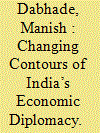

|
|
|
|
|
| Summary/Abstract |
This article explores India’s economic diplomacy since its early years of Independence, from the margins to a relative significance in the global economic hierarchy. It begins by identifying the constant, governing first principles and core objectives of India’s economic diplomacy that have remained constant over the years. The first three sections broadly embody the distinctive phases of India’s economic diplomacy, each laced with turning points, challenges and shifts entailed therein. The article ends with a concluding section that provides an analysis of India’s economic diplomacy in terms of broader trends, current challenges and the road ahead in the policy-relevant future.
|
|
|
|
|
|
|
|
|
|
|
|
|
|
|
|
| 2 |
ID:
185666


|
|
|
|
|
| Summary/Abstract |
Earth’s climate is changing drastically and its effect is being felt over the entire world. Some nations suffer more because of several geographical and demographical factors. People have started migrating from their homeland because of the disasters occurring due to climate change. These migrants commonly known as climate refugees are homeless and without rights. However, the United Nations High Commissioner for Refugees (UNHCR) has recognised the need to protect climate refugees and has taken initiatives to relocate the climate refugees. Recently, the United Nations Human Rights Committee (UNHRC) ruled that no country can send back a refugee whose life is at imminent threat due to climate change. Even though this decision is non-binding on the countries, it puts an international pressure on countries to act soon concerning climate refugees. India is one of the countries which might face a great migrant influx from neighbouring countries. The Sundarbans1 Delta of Bangladesh is one of the high-risk areas and it is estimated that around 50–120 million climate refugees might migrate to India. India needs to be prepared for this crisis and develop a sound refugee policy framework. Against this backdrop, this research article aims to highlight legal issues relating to the protection of climate refugees in India and suggests policy measures to overcome the crisis.
|
|
|
|
|
|
|
|
|
|
|
|
|
|
|
|
| 3 |
ID:
185652


|
|
|
|
|
| Summary/Abstract |
As Asia’s largest and most rapidly rising powers in contemporary global politics, relations between India and China are becoming evermore intertwined with each other. Clear commonalities typify this symbiosis, including a shared civilisational basis, a mutual desire to rebecome great powers in international relations and common modernisation goals. At the same time, relations are beset by a number of issues, most notably long-standing territorial disputes, frictions over regional hegemony and wider diplomatic tensions (most prominently relating to China–Pakistan and India–United States ties). As such, India–China relations can be considered to resemble a ‘double-edged sword’, whereby elements of their interaction can be regarded as having concurrent benefits and liabilities. This article explores the historical roots and contemporary realisation of such a core dynamic over the last 75 years of relations between New Delhi and Beijing and investigates how their strategic goals are often simultaneously convergent and divergent.
|
|
|
|
|
|
|
|
|
|
|
|
|
|
|
|
| 4 |
ID:
185655


|
|
|
|
|
| Summary/Abstract |
This article traces the development of Europe–India ties through history, highlighting periods which laid down the fundamental structure of the partnership until the present day where the challenges presented by China’s rise and a search for the diversification of partnerships have driven Europe and India closer. The article looks at where Europe, particularly the EU, sits in India’s broader foreign policy and argues that while Europe and India are still not fully aligned on all issues—particularly the extent of threats posed by China—there is finally enough convergence for the actors to build a broad-based partnership beyond just trade and commerce.
|
|
|
|
|
|
|
|
|
|
|
|
|
|
|
|
| 5 |
ID:
185664
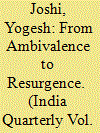

|
|
|
|
|
| Summary/Abstract |
This article aims to understand India’s remarkable nuclear journey in the last 75 years. It categorises India’s atomic trajectory into four distinct periods: Ambivalent (1948–1988), Reserved (1989–1998), Responsible (1998–2008) and Resurgent (2009 onwards). In doing so, the article provides an account of how the changing nature of India’s nuclear programme has impacted the scope and depth of its nuclear deterrence. However, the programme’s status is also consequential for India’s foreign policy practice and its approach to using force in international politics. The article shows how India’s nuclear capability, its foreign policy practice, and its approach to the use of force have seen dramatic shifts in the last thirty years. A resurgent India aims to become a world-class nuclear power, undisturbed by foreign perceptions of its atomic programme and increasingly resolute to use force even under the threat of escalation by its nuclear adversaries.
|
|
|
|
|
|
|
|
|
|
|
|
|
|
|
|
| 6 |
ID:
185667


|
|
|
|
|
| Summary/Abstract |
The trajectory of India’s rise and its attendant international conduct through 75 years of its independence is an appreciable anomaly from the perspective of International Relations (IRs) theory. India’s decided policy of nonalignment soon after independence belies realist predictions of weak states adopting a bandwagoning behaviour (Walt, 1985); its assertion of strategic autonomy broadly nullifies the constructivist account of increased socialisation and identification shaping alliance behaviour; and its characteristic strategic restraint invalidates the realist affluence theory. Paradoxical assessments such as ‘arming without aiming’ and ‘emerging but never arriving’ draw attention to a unique path that India has trodden. What this reveals, perhaps, is both the inadequacy of Western explanations of state behaviour and the agency of a geo-culturally conditioned view of statecraft that is perceptibly at intellectual odds with the dominant Eurocentric one.
|
|
|
|
|
|
|
|
|
|
|
|
|
|
|
|
| 7 |
ID:
185657
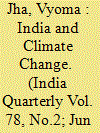

|
|
|
|
|
| Summary/Abstract |
Climate change emerged as a serious diplomatic concern for India in the early 1990s. India has since been a staunch champion of the developing world, in multilateral climate negotiations; from playing a key role in establishing the principle of common but differentiated responsibility and respective capabilities, to forging alliances with countries with shared developmental concerns. Faced with the growing impact of climate change and changing geopolitics, India’s foreign policy on climate change has undergone significant shifts during two decades of multilateral climate talks. First, India’s willingness to undertake domestic climate action as a result of its changing economic status and, second, the role of the political leadership—since Prime Minister Narendra Modi came to power in 2014—in shaping the climate discourse both in the country and abroad. India has, in recent years, shed its defensive, naysayer strategy at climate negotiations and led several multilateral initiatives for climate action. As India celebrates 75 years of its Independence, it is forging a new, confident leadership on issues of climate change. While there is continuity in India’s traditional stance on finance and technology transfer during negotiations, Indian foreign policy has begun to display a marked change in the strategic use of climate change to assert greater power on the global stage.
|
|
|
|
|
|
|
|
|
|
|
|
|
|
|
|
| 8 |
ID:
185656


|
|
|
|
|
| Summary/Abstract |
India has been a long-time supporter of nuclear disarmament. Much before other countries supported these measures, India had proposed universal nuclear disarmament, a nuclear test ban treaty as well as a freeze on the production of fissile material. Opinion is however divided on India’s approach and rationale behind pursuing disarmament. Some call it utopian while others describe it as a pragmatic approach that suited India’s national security needs at that time. India has always had a peculiar relationship with the nuclear non-proliferation regimes. India stressed disarmament as a solution for nuclear proliferation and has viewed nuclear disarmament as enhancing its security interests. This article divides India’s advocacy of global nuclear disarmament into six phases beginning from India’s independence in 1947 to the current period when two parallel tracks have emerged in India’s nuclear diplomacy—one track has continued with its traditional advocacy of universal nuclear disarmament, while the second track where it has engaged with the prevailing non-proliferation regime. India’s nuclear disarmament diplomacy has moved away from moral and ethical considerations to highlighting national security considerations. It is no longer anchored on the ‘disarmament or no disarmament’ question as the traditional disarmament advocacy of India often posed. Instead, the current Indian diplomacy is focused on the emerging rules and frameworks of governance in international security matters and how India can be part of it—multilaterally or through coalition of like-minded partners.
|
|
|
|
|
|
|
|
|
|
|
|
|
|
|
|
| 9 |
ID:
185669


|
|
|
|
|
| Summary/Abstract |
Managing India’s strategic predicament is a herculean task. China’s revisionist rise in the global order and its aggressive interventions along the Sino-Indian border is a pressing challenge. Augmentation of the role of non-state actors (NSAs) and non-traditional security issues in world affairs are other critical challenges for academia and policymakers. Persisting territorial disputes, residual from colonialism, have resurfaced in a new avatar of ‘Asian Century’ and great power politics in the region. These pose multiple challenges to practices of border management, migration, refugees, ethno-communal-religious tensions and interstate cooperation. India and the international community have to manage the aggregated impact of both ‘high politics’ and ‘low politics’ in contemporary world affairs with a complex canvas.
|
|
|
|
|
|
|
|
|
|
|
|
|
|
|
|
| 10 |
ID:
185651
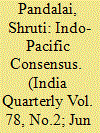

|
|
|
|
|
| Summary/Abstract |
The view that the concept of the Indo-Pacific is not new nor an aberration has anchored New Delhi’s embrace of this geopolitical reality and the articulation of its central role and vision for this dynamic theatre. This revisiting of history has happened, in New Delhi’s understanding, because of drivers such as globalisation, multipolarity and a recognition by the United States that it needs to work with others to manage the disruptive rise of China, among other global challenges. India has always considered itself an Indo-Pacific actor, given its geographical location, its interests and stakes primarily in the Indian Ocean and increasingly in the pacific, its bilateral partnerships which then see a shared interest in the region, its presence in existent Indo-Pacific bodies spanning the two oceans and its growing role as a provider of net security and preferred maritime security partner for many countries in the Indo-Pacific. This article traces the evolution of the Indo-Pacific in New Delhi’s strategic calculus and its pre-eminence as a theatre of geo-strategic and geo-economic opportunity. It argues that three trends have emerged as distinguishable features, which serve as building blocks of cooperation in the Indo-Pacific today, especially for India: (a) issue-based coalitions driven by function, where flexibility of these configurations remains a strategic asset, (b) like-minded countries working together in overlapping bilateral, minilateral and plurilateral formats to expand global initiatives in a way that they are institutionalised within the national agendas of regional like-minded powers and (c) a focused effort on building capacity of countries in the Indo-Pacific to give them viable alternatives which go beyond binaries formed around ideological and political contestation. Post COVID-19, consolidating the India way in the Indo-Pacific will depend on how India strengthens its domestic capacity and shapes geopolitics at the regional and global levels.
|
|
|
|
|
|
|
|
|
|
|
|
|
|
|
|
| 11 |
ID:
185653
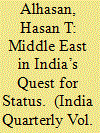

|
|
|
|
|
| Summary/Abstract |
The temptation to explain India’s foreign policy behaviour in the Middle East through the lens of power alone has obscured a rich history of Indian diplomacy in the region that escapes power-centric explanations. India’s relentless advocacy for Palestinian statehood, its diplomatic support for the weaker Arab states against Israel and Western powers and its role in UN mediation and peacekeeping missions in the region are difficult to explain using a structural realist framework that privileges power alone. Challenging the dominant historiographies, this article introduces the concept of status into the study of India’s behaviour in the Middle East. Based on a re-reading of secondary sources, it argues that status and power have been articulated in various ways in India’s behaviour in the Middle East. Under prime ministers Jawaharlal Nehru and Indira Gandhi, India pursued status without power, following a primarily normative strategy of status-seeking in the region that afforded India considerable deference at the United Nations and the Non-Aligned Movement. Following India’s nuclear tests of 1998 and a decade of economic growth, however, power and status converged in India’s behaviour in the Middle East through further alignment with US interests in the region and greater use of naval power projection. By shedding light on the various possible ways in which status and power articulate, this article attempts to step away from the artificial opposition between morals and self-interest as guiding principles of foreign policy. The inquiry into status challenges the prevalent historiographies and analytical frameworks that have dominated the discussion on India’s foreign policy in the Middle East, generating productive openings for reconceptualising and reimagining the field.
|
|
|
|
|
|
|
|
|
|
|
|
|
|
|
|
| 12 |
ID:
185661


|
|
|
|
|
| Summary/Abstract |
India has been a point of attraction for world throughout the history as ‘Golden Bird’ as land of spiritualism, architectural marvels and cultural heritage. Buddhist ‘Middle Path’ to Kautaliya’s pragmatic political thought and Gandhi’s strategy of Satyagraha and non-violence attract appreciation around the world. The two decades of 21st century has immensely boosted India’s soft power. Yoga and Ayurveda have assumed prominent place in the life and practice of people worldwide with celebration of ‘International Yoga Day’.
|
|
|
|
|
|
|
|
|
|
|
|
|
|
|
|
| 13 |
ID:
185659


|
|
|
|
|
| Summary/Abstract |
In this article, the authors highlight the need for refugee legislation in India while India celebrates its 75 years of independence. India should have domestic legislation to uniformise legal and conceptual understanding of refugees, to uniformise the procedural standards for all refugees without discrimination, to address the increasing influx of refugees due to increase in conflicts in the neighbouring geography such as Afghanistan and Myanmar and due to increasing threats of sea-level rise and de-territorialisation.
|
|
|
|
|
|
|
|
|
|
|
|
|
|
|
|
|
|
|
|
|